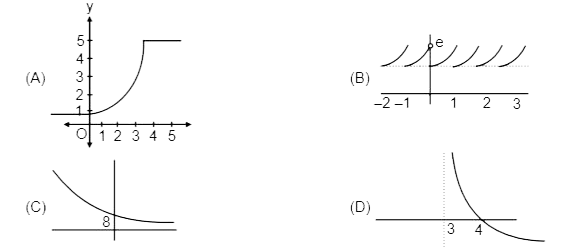कथन -1 f:[0.∞)→[0,∞) एक फलन f,y=f(x)=x2 द्वारा परिभाषित है , तो (d2ydx2)(d2xdy2)=1.
कथन -2 d2ydx2=−d2xdy2(dydx)3
कथन-1 सत्य है, कथन-2 सत्य है , कथन-2, कथन-1 का सही स्पष्टीकरण है।
कथन-1 सत्य है, कथन-2 सत्य है , कथन-2, कथन-1 का सही स्पष्टीकरण नहीं है।
कथन-1 सत्य है, कथन-2 असत्य है |
कथन-1 असत्य है, कथन-2 सत्य है।
The correct Answer is:D
Step by step video & image solution for कथन -1 f: [0.oo) to [0,oo) एक फलन f, y = f (x) = x ^(2) द्वारा परिभाषित है , तो ((d ^(2) y )/( dx ^(2)) ) ((d ^(2) x )/( dy ^(2))) =1. कथन -2 (d ^(2) y )/( dx ^(2)) =- ( d ^(2) x )/( dy ^(2)) ((dy)/(dx)) ^(3) by Maths experts to help you in doubts & scoring excellent marks in Class 12 exams.
Updated on:21/07/2023Topper's Solved these Questions
Similar Questions
फलन f1(x)=⎧⎪⎨⎪⎩1यदिx≤0x2+1यदि0<x<25यदिx≥2,f2(x)=log1/2(x−3),f3(x)=23−x तथा f4(x)=e{x} जहाँ {.} भिन्नात्मक भागफलन को प्रदर्शित करता है, के आरेख निम्न (क्रम में नहीं) है-

फलन f1(x),f2(x),f3(x) एवं f4(x) के आरेखों का सही क्रम होगा-
View Solutionf(x)=cos(sin(ln(x2+ex2+1)))+sin(cos(ln(x2+ex2+1)))
View SolutionIf x=logp and y=1p ,then (a)d2ydx2−2p=0 (b) d2ydx2+y=0 (c)d2ydx2+dydx=0 (d) d2ydx2−dydx=0
View Solutionx(d^(2)y)/(dx^(2))+(dy)/(dx)+x=0
View Solution(d^(2)y)/(dx^(2))=x^(2)sin x, givenatx =0 if y=0,(dy)/(dx)=1
View Solution(d^(2)y)/(dx^(2))=(1)/(1+x^(2)) whenx =0,y=0 and (dy)/(dx)=0
View SolutionIf y=f(x),p=dydxandq=d2ydx2, then what is d2xdy2 equal to ?
View Solutionयदि y=xx तो सिद्ध कीजिये कि d2ydx2−1y(dydx)2−y=0
View SolutionSTATEMENT -1 : for the function y= f(x), f(x),{1+(dydx)2}32d2ydx2=−{1+(dxdy)2}32d2xdy2
STATEMENT -2 : dydx=1dxdyandd2ydx2=ddx(dydx)
View Solutionfor any differential function y=F (x) : the value of d2ydx2+(dydx)3.d2xdy2
View SolutionIf x+y=tan−1y and d2ydx2=f(y)dydx, then f(y)=
View SolutionIf x+y=tan−1y and d2ydx2=f(y)dydx, then f(y)=
View SolutionIf x+y=tan−1y and d2ydx2=f(y)dydx then f(y)=
View SolutionIf x+y=tan−1yandd2ydx2=f(y)dydx, then f(y) =
View SolutionStatement 1: If f:[0,oo)to[0,oo) Which is a function y=f(x)=x^(2) If defined by ((d^(2)y)/(dx^(2)))((d^(2)x)/(dy^(2)))=1 Statement - 2: (d^(2)y)/(dx^(2))=(d^(2)x)/(dy^(2))((dy)/(dx))^(3)
View Solution
